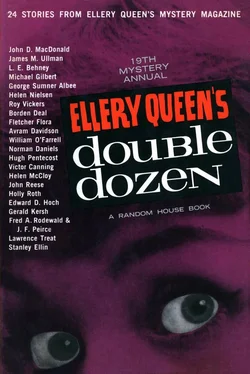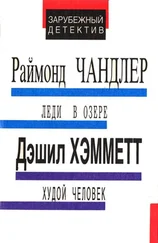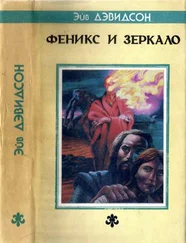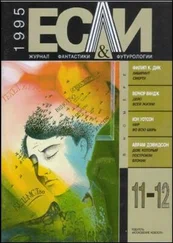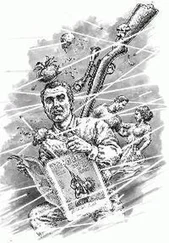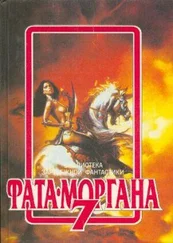Mrs. Palmer smiled. “I rather think you had quite a lot to do with it, Captain. Jason has told me...”
“Well, that’s neither here nor there. I dropped by to pick up your son. He’s riding with us — in the first car.”
“You’re taking me?” Jason said in a shrilly excited voice.
“See this badge?” McDermott brushed it reverently. “It’s made of gold, but if I show up without you, Jason, tomorrow it’ll be tin. And we’ve got to hurry. Every man on the force — or almost all, we had to leave a skeleton force on duty — is ready to start marching.”
Jason whirled and pounded up the stairs with an ear-splitting din.
“Hold on,” McDermott called out, “we’ve got to leave.”
“I forgot something,” Jason called.
“Thank you, Captain,” Mrs. Palmer said. “This means so much to Jason.”
“He rates it,” McDermott said crisply. “More important, Patrolman Cameron rates it.”
Jason raced down the stairs just as noisily, avoiding breaking a leg or his neck by some miracle of Providence watching over excited boys. He paid no attention to where his feet landed. He was too busy buckling on the slightly soiled, white Sam Browne belt and armband proclaiming him a member of the school traffic patrol.
He looked up at McDermott very seriously.
“I forgot my uniform,” he said.
Hugh Pentecost
In the Middle of Nowhere
This story opens with the violence of Nature against Man — and closes with the violence of Man against Man... an exciting tale of suspense that might he called a perfect example of “the modern American thriller.”
* * *
Rain beat against the windshield of the Imperial so hard it was as if someone were playing a hose on it from the front. The narrow two-lane road was awash, and it sloshed against the bottom of the car in recurring waves. The thin man at the wheel leaned forward, trying to see anything but water in the beam from the headlights.
“Can’t see over ten yards ahead,” he said. “Butt me.”
The plump man sitting beside the driver fished a cigarette out of his pocket and lit it with the dashboard lighter. He passed it on to the driver, who sucked smoke deep down into his lungs.
Police and F.B.I. had records on these two men. The thin driver was Ray Stack, with a long background of larceny and assault. The plump one, with an almost baby face, was Perry McVey, wanted for bank robbery and murder. He was classified as one of the most dangerous wanted criminals in the country.
“I’ve just about had it, Perry,” Ray Stack said. “Couldn’t we pull up for a little bit? The rain’s bound to ease off.”
“Why? It hasn’t eased off for two days, has it? Any rule says it will ease off if we pull up for a few minutes? You been noticing the streams and brooks we’ve been crossing? Water right up to bridge level in most cases. We’re right in the middle of a flood area, kid, and you better pray we get out of it before it closes in on us somewhere. Pull up, my foot!”
“It gets worse as we go along,” Stack said.
“According to the road map we should be crossing the Massachusetts Turnpike in another ten or fifteen miles. After that we’ve got some choices depending on how things look. But we got to stick to this route until we cross the turnpike.”
The car hit a small pond in the middle of the road. The big motor skipped a beat and then purred on.
“Get water in the distributor and we’ve had it, brother!” Stack said. He crushed out his cigarette in the dashboard tray and slid it closed.
Suddenly McVey leaned forward, peering through the swirl of rain on the windshield. “Light up ahead — small, moving light.”
“Looks like someone waving a torch!” Stack said.
The plump man’s lips tightened as he reached for a brief case on the seat beside him. He zipped it open and produced a .45 automatic from its soft leather interior. “Road block!” he said, grimly.
Stack’s hands tightened on the wheel. “We talk our way through?”
“Don’t be a damn fool,” McVey said. “We’re not stopping. Not now. By now we’re probably famous.”
“But, Perry—”
“You sucker!” McVey snarled. “You want to die right here on this stinking country road? Step on it!”
They were almost on top of the waving flashlight. Stack pushed the accelerator to the floor. The big car leaped forward, straight at the frantic torch. For just a moment the headlights picked up the figure of a young man, his mouth opened in a scream. Then the car hit him head on, with all the impact of its three-hundred-odd horsepower.
“Look out!” McVey shouted. “Bridge ahead — covered bridge! Left, Ray! Left!”
There was a screech of rubber as the car swung left and dove into what was a dark tunnel — one of the few remaining covered bridges in New England. For a moment the rain was gone.
“He’s caught under the car!” Stack said in a shaking voice. “We’re dragging him!”
“Keep going!” McVey had swiveled around in the seat and was peering out the back window. “Doesn’t seem to be anyone else.”
The car jounced as though it had hit a bump in the wood floor of the bridge, and then raced on smoothly. Stack wiped sweat from his face with the sleeve of his coat. “We left him there,” he said.
The car burst out of the bridge and into the torrential rain again.
“Pull up!” McVey shouted.
“You crazy?”
“He may not be dead,” McVey said. “Pull up. Give me the flashlight out of the glove compartment.”
“It’s right in front of you.”
Stack had stopped the car. Now he leaned forward, his forehead pressed against the wheel.
McVey, gun in one hand, flashlight in the other, climbed out into the rain. Wind tore at him, sent him zigzagging back along the road toward the covered bridge. The car had gone a good fifty yards past it before it had stopped. McVey had retraced about half the distance, flashlight focused on the mouth of the bridge, when it happened. There was a thunderous roar of water, the noise of splintering timbers, and like a child’s toy the covered bridge exploded into a thousand bits and pieces and was swept out of McVey’s sight on a tidal wave of water.
McVey sprinted back along the road toward the car. A tail-flick from the mass of water caught him and sent him somersaulting into the ditch beside the road. He managed to scramble to his feet, spitting out water and mud, and staggered for the car. He literally fell into it.
“Get moving!” he shouted. “It’s a cloudburst, or something!”
The big car jumped forward. “You see him?” Stack asked, his eyes peering straight ahead.
“He’s dead,” McVey panted. “Bridge broke up like matchwood. He’ll be hamburger when they find him. Nobody’ll know what really happened to him. First good break we’ve had in the last twelve hours!”
“You suppose it was a cop trying to stop us?”
McVey wiped muddy water from his face with his handkerchief. “What difference does it make now? We couldn’t take a chance, could we?”
The summer floods of 1955 which turned such Connecticut towns as Winsted, Torrington, and Danbury into national disaster areas, had bypassed the town of Lakeview. On this summer night in 1959 when nightmare floods struck again, Lakeview was prepared for the worst, but again was spared from the heaviest kind of destruction. Power went. Phones went. Cellars filled with water and in some cases cesspools overflowed and carried their filth into the main streets of the town.
But there was no loss of life — or there had been none until the covered bridge at the north-end town line went. When that happened, Lakeview sat dark, water-soaked, and cut off from the outside world. There was no news except that of the flood itself and that news came over the emergency radio channels.
Читать дальше
